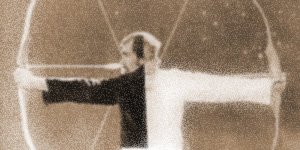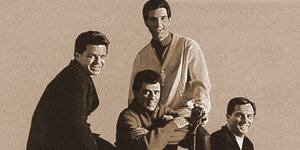The Beat Goes On, Part VII.

140. Sagittarius “My World Fell Down”
(John Carter/Geoff Stephens)
1967
Available on Nuggets: Original Artyfacts From the First Psychedelic Era
California sunshine pop is the most difficult musical genre to write about, because there’s nothing to grab hold of: you either fall in love with it instantly or it makes you want to throw up. Not that this is typical California sunshine pop, though (try the Yellow Balloon, the Free Design, and the Millennium for that); it’s actually a British pop song, with minor-chord moodiness and “Cause it’s wintertime/And the leaves are brown/Since she went away/My world fell down” for the chorus. Kind of Left-Banke-meets-the-Beach-Boys, if that thrills you. Plus a brief musique-concrète bridge collaging crowd noise, a baby crying, and Mexican film music into a Good Vibrations-type organ. Brian Wilson reportedly was passing by the studio, stuck his head in at the door, and said, “What is that?” Surf magnate Gary Usher and bliss-pop producer Curt Boettcher just shrugged. “Oh . . . just something we’re working on.” It wasn’t a hit, even though Glen Campbell sings the lead and Beach Boy Bruce Johnston sings backup.
139. The Temptations “Ain’t Too Proud to Beg”
(Eddie Holland/Norman Whitfield)
1966
Available on Gettin’ Ready
When you’re growing up and your only reference points for music are what you see on the Guatemalan music-video channel and the songs your friends hear in movies, you have no idea that the incredibly annoying “My Girl” (this was just after the Macaulay Culkin movie) has any connection with TLC’s “Ain’t 2 Proud 2 Beg” (ooh, sexy!), and so when you finally hear the Temptations’ original, you’re quick to dismiss it as saccharine-pop r&b like you thought “My Girl” was (although years later when you hear the Rolling Stones butcher “My Girl” you realize how great the original was). But then you grow up a little and learn more about music and life and movies and sexiness and saccharine, and suddenly when “Ain’t Too Proud to Beg” comes on the oldies radio (which it does way more often than you’d expect given most peoples’ image of the Temptations) you crank it up and sing along with David Ruffin as loud as you dare, totally screwing up the bits when he breaks into falsetto, but the rhythm section makes up for it, and you dance a little there in your car, stuck in bumper-to-bumper traffic on the freeway.
138. The Four Seasons “C’mon Marianne”
(Raymond Bloodworth, Russell Brown)
1967
Available on The Very Best of Frankie Valli & the Four Seasons
I like to imagine that this song (and Leonard Cohen’s “So Long, Marianne”) are about Marianne Faithfull, even though I know they’re not. But this actually sounds a bit like the Four Seasons doing the Rolling Stones: it’s garage-rock tough and loud, even if it’s Crewe/Gaudio neat, without a hair out of place or an uncreased slack. And Valli’s piercing falsetto carries no hooks — which means the song’s not as instantly memorable as a “Sherry” or a “Big Girls Don’t Cry,” but it’s also not as irritating as either of those. No, seriously: check out the chunky, meaty guitar parts, the galloping beat, and the Beach-Boys-on-steroids roar of the harmonies. These guys have always been the least-admired of the hitmaking machines of the 60s, and although there’s a reason for that, they don’t deserve to be ignored, either. I mean, it’s no mean feat, racking up a lot of hits in the 60s. They had to have more than just mob connections going for them.
137. The Ikettes “I’m Blue (The Gong-Gong Song)”
(Ike Turner)
1961
Available on One Kiss Can Lead to Another: Girl Group Sounds Lost and Found
Even the piano line that starts the song off is funky. Maybe most people are familiar with this song because the 5.6.7.8.’s sang it in Kill Bill, Vol. 1 (along with the A*Teens’ “Woo-Hoo”), or maybe they know it through Salt ’n’ Pepa’s retarded “Shoop” remake, but neither of those has a young Tina Turner wailing “Hey! Bom-bom-ba-ba-bom-bom yeah.” It’s pitched at a strange place between garage doo-wop, r&b girl group, and Motown soul at its earthiest. The Ikettes, of course, were a revolving-door backup group that allowed Ike Turner to put one more name on the bill when his and Tina’s group toured; they were also one of the greatest singles acts of the 60s, crossbreeding Tina’s guttural soul with the demure shang-a-lang of groups like the Chiffons, and often as not breeding works of pure nursery-rhyme magic from them, with Ike playing Phil Spector to their Crystals (or Berry Gordy to their Supremes). A good box set of Ike Turner’s greatest work from 1953 to 1975 is in desperate need of being compiled; it’d shock all the people who think of him as nothing more than a wife-beater. Which, don’t forget, he was.
136. The Jimi Hendrix Experience “Little Wing”
(Jimi Hendrix)
1968
Available on Axis: Bold As Love
It’s difficult to find Hendrix songs that don’t feel overly familiar from classic-rock radio and any TV show or ad wanting to signify The Sixties. But this one is better-known through its Derek & the Dominos and Stevie Ray Vaughan covers, so listening to the Hendrix original can still sound fresh (to me, anyway). It’s very basic, but the hippie-madonna in the lyrics still remains a potent cultural myth, recognizable in a thousand million lyrics by bedroom guitar players projecting their own fantasies of femininity onto the girls they think they’re in love with. (And yeah, that’s a dig at Clapton.)
135. The Kinks “A Well-Respected Man”
(Ray Davies)
1965
Available on Well-Respected Kinks
Before this song, the Kinks were great because of their monster riffs and the way Dave Davies raised the stakes on sheer sonic bravado. After this song, the Kinks were great because of Ray Davies’ shrewd eye for social commentary married to a sense of melody that’s as purely English as anything Benjamin Britten ever did. If the song had only rhymed “regatta” with “get at her,” it would be brilliant, but the needlepoint precision of the line “And he hopes to grab his father’s loot/When pater passes on” announces the most literate, intelligent voice in British pop since Noël Coward . . . and possibly ever since, too. The title character, of course, is one of the stock characters in British popular fiction (think Mr. Banks from Mary Poppins as a young man, and you’ve got it).
134. Laura Nyro “Stoney End”
(Laura Nyro)
1967
Available on The First Songs
Barbra Streisand had a hit with this song, but for a multitude of reasons, Nyro’s is better. My favorite reason is that she can’t sing very well; she’s always slipping in and out of key, which on this song helps to sell the illusion that she’s a poor country girl heading back home instead of a nice Jewish New York pianist whose primary melodic influence is advanced Broadway composers like Bernstein, Sondheim, and Blitzstein. When Barbra sings the song, she sounds like she’s performing in a musical. Laura — and this is a key difference — sounds like she’s performing in a musical based on her life. Maybe it just comes down to the fact that she’s a better soul singer, always catching up to the melody breathlessly. You would expect a singer-songwriter to write for their own voice; one of the things that makes Laura Nyro great is that she’s always straining to sing her own songs.
133. Herman’s Hermits “I’m Into Something Good”
(Gerry Goffin/Carole King)
1964
Available on The Hermhits
The lightest, fluffiest pop song of the decade from the lightest, fluffiest pop group of the decade. There’s something attractively winsome in Peter Noone’s vocals that can sell even the dopiest song (“Mrs. Brown You’ve Got a Lovely Daughter” almost made the cut), and even if the rest of the “band” just sits around twiddling their thumbs in the studio, the simple charm of the Hermits makes me that much more irritated by the increasingly noisy, flashy, attitude-driven and sexualized acts that have been marketed to pre-teens since. Not to sound like your grandpa or anything, but they don’t make ’em like this anymore, more’s the pity.
132. Jimmy Durante “September Song”
(Maxwell Anderson/Kurt Weill)
1963
Available on As Time Goes By: The Best of Jimmy Durante
If you don’t love Jimmy Durante, you may not be human. Okay, I guess I should qualify that. If you have any sympathy towards, understanding of, appreciation for, or interest in the Golden Age of American Comedy, which stretches from vaudeville in the early 1900’s to I Love Lucy (more or less), then you love Jimmy Durante. Funnily enough, for someone so deeply associated with baggy-pants type comedy, he never played vaudeville; he was always a nightclub performer, his explosion of energy directed towards an intimate audience, and an excellent jazz pianist. He also had a streak of sentiment a mile wide, which was exploited on the pair of records he made in the early 60s. The song which triggered this late-career renaissance was Kurt Weill’s timeless chestnut “September Song,” a song about growing old and taking it easy. Durante’s hoarse bark can be difficult to take seriously, but if you let it, the song can move you to tears. Shame about the backing choir, though; depending on which Disney movies you grew up watching on VHS, it can sound either spooky or disgustingly maudlin.
131. The Byrds “All I Really Want to Do”
(Bob Dylan)
1965
Available on Mr. Tambourine Man
Roger McGuinn has the greatest wuss voice in rock music. (This is not something that may be debated. It simply is.) So it’s fitting, of course, that he sings the lyrics to what might be the greatest wuss song in rock music. (Since the rise of emo, this is way debatable. But being the first scores hella points.) Don’t get what’s so wussy about it? Dig: the singer doesn’t want to have any impact on the chick’s life at all, apparently: he just wants to be friends. It’s not only wussy, it’s creepy-wussy; you can just tell he’s only feeding her this line so he can get into her bell-bottomed blue jeans. And for that narrative complexity (as well as the gorgeous descending harmonies on “baby be friends with you”, this is one of the greatest early Byrds songs. Better than all their jangle-pop imitators, even though they didn’t try.
Next: 130-121. >>

2 comments:
Finally...some appreciation for the sublime art of Bob Crewe and Fanki Valli. True, some of their hits were a bit annoying, but even their worst songs were backed with fantastic vocals and the best non-Spector production outside of Detroit. Their oeuvre is something to behold.
Ike Turner might be almost as loathsome a person as Chuck Berry, but I have always, always, always loved his ability to play a guitar or a piano, and he deserves credit for the first rock n roll recording with Rocket 88.
- rick
Post a Comment